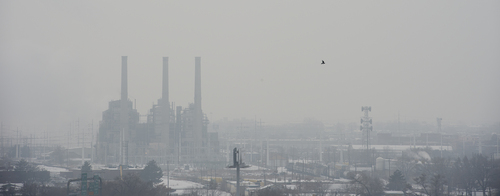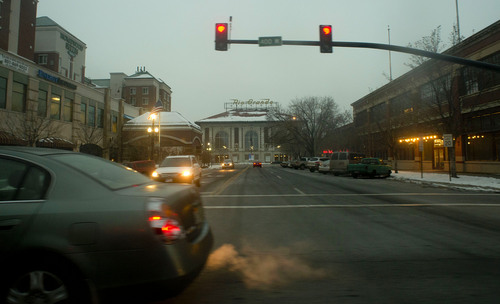This is an archived article that was published on sltrib.com in 2013, and information in the article may be outdated. It is provided only for personal research purposes and may not be reprinted.
Cleaner school buses, grants to small businesses and research are the main pieces of an $18 million bag of carrots Utah Gov. Gary Herbert proposes handing out next year to improve air quality.
Much of the proposed spending is designed to help school districts and small businesses reduce emissions that add to the particulate and ozone levels in Utah valleys. This pollution often makes the air unhealthy and drags economic growth.
"There is a larger commitment from the governor with fewer funds. This is the most [spent on air quality] in the state's history," said Herbert's budget director Kristen Cox.
The governor's staff outlined Herbert's air-quality plan earlier this month while rolling out the state's $13.3 billion budget. The Legislature will get a say in the upcoming session, where several anti-pollution measures are expected to be aired.
Herbert wants to spend $14 million to retrofit buses with cleaner-burning diesel engines or replace them with ones powered by compressed natural gas. About half of this money would be spent to build fueling stations and the other half would go into a revolving loan fund, which districts would be invited to tap and replenish.
"It will save money in the long run," because compressed natural gas is cheaper, Cox said. "The savings is a way to pay it back and help other school districts move forward."
The state recently adopted plans for getting Utah and Salt Lake valleys into compliance with federal standards for fine particulate matter, or PM2.5. These plans phase in 23 new regulations on so-called "area sources" of pollution.
Herbert wants to establish a grant program, administered by the Utah Clean Air Partnership, to help small business, such as auto-body and furniture shops, comply with these new rules. These rules typically require new equipment, materials and processes for applying finishes. Many large shops have already adopted paints and degreasers low in volatile organic compounds, which require new applicators and employee training. But such investments might not be economical for small outfits, and airquality.utah.gov/Permits/Small_Business_Assistance_Program.htm">financial assistance is warranted, according Bryce Bird, director of the state airquality.utah.gov/">Division of Air Quality (DAQ).
"It doesn't pay for everything. They have to match," Bird said. "Seed money like this with their investments could go a long way to make sure they have the right equipment and right solvents in place."
Herbert's carrot bag does hold a couple sticks, mainly in the form of new DAQ staffers to enforce anti-emission rules, such as the periodic bans on wood burning. The governor intends to add four people and new equipment to the 97-employee division, at a cost of about $800,000. Two of the new staffers would be assigned to the Uinta Basin, which is experiencing a boom in oil and gas development. The division wants to drop $100,000 on an infrared camera needed to detect gas leaks.
The final piece of the package is $1 million devoted to research whose findings officials hope will help ensure policy decisions are based on sound science.
Where to report violations
As the winter's second inversion takes hold, the Salt Lake Valley Health Department is asking residents to report wood burning and other air-quality violations. To airquality.utah.gov/aqp/forecast.php?id=slc">combat polluted skies the state has called for "mandatory action," banning the use of solid-fuel appliances and fireplaces and asking the public to take steps to reduce emissions.
You can report violations by calling 385-468-8888 and visiting the Health Department website. Be sure to include the date and time you observed the smoke and the address.
The county has yet to ban idling, as Salt Lake City has done, but you can still report "excessively smoking motor vehicles" to the department, and it doesn't have to be a no-burn day. Be prepared to provide the car's make, model and licence plate number and the location and time it was observed.
You can also submit complaints to the Utah airquality.utah.gov/">Division of Air Quality, at airquality.utah.gov. —
Share the story of your bad air day
I For some Utahns, inversion season is simply annoying. It means fewer outdoor exercise days, eye-and-throat irritation and a less-than-picturesque view. For others, though, the cloud of pollution that clings to the valley floor is a serious threat that exacerbates existing health problems and makes Salt Lake City virtually unlivable in the winter months.
How does poor air quality affect you? The Salt Lake Tribune and KUED Channel 7 want to hear your bad air day stories — whether written or video-recorded.
Send written stories to utairquality@sltrib.com or outreach@kued.org with "My Bad Air Day" in the subject line, or share them at facebook.com/saltlaketribune or facebook.com/kuedchannel7.
You also may share video stories on Tout at http://www.tout.com/sltrib or by using the hashtag #mybadairday on Instagram.
The Tribune and KUED will share your stories as part of our ongoing air quality coverage. —
Town hall Jan. 29 on Utah air quality
O The Tribune's Jennifer Napier-Pearce will moderate a town hall discussion on Utah's air quality challenges with a panel of experts on Jan. 29 at 7 p.m. at the Salt Lake City Main Library, 210 E. 400 South, Salt Lake City. The discussion will be broadcast live on KCPW 88.3/105.3 FM and at sltrib.com. You can submit questions in advance by sending an email to utairquality@sltrib.com. —
Join us for a Trib Talk
I The geography of Wasatch Front valleys presents unique challenges to cleaning up the air. But just how bad is air pollution and what are scientists still trying to learn?
In the first in a series of conversations about Utah air pollution Monday at 12:15 p.m. at sltrib.com, Jennifer Napier-Pearce will moderate a live TribTalk video chat with airquality.utah.gov/">Division of Air Quality director Bryce Bird, University of Utah air quality researcher Kerry Kelly and BYU emeritus chemistry professor Delbert Eatough about new ways scientists are measuring the toxic ingredients in Utah's air which could lead to more effective ways of getting rid of the gunk.





